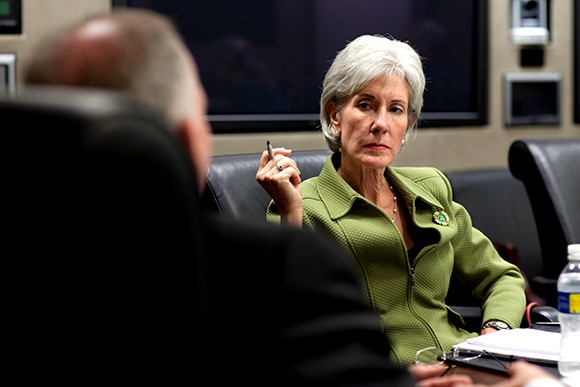
Kathleen Sebelius at an HHS meeting in 2009. (White House media photo)
On a day when President Barack Obama signed an executive order mandating equal pay for women working for federal contractors, Fielding Graduate University hosted Health and Human Services Secretary Kathleen Sebelius for a more down-to-earth discussion about women and jobs.
A distance-learning pioneer, Sebelius recounted how, as a recent college graduate, she spent her first day on the job shadowing “Rev” a community leader in Washington, D.C. who was helping ex-convicts get jobs in the wake of the devastation riots that followed the assignation of Dr. Martin Luther King.
“He would push open the door of a pawn shop and point to me and say ‘Don’t fuck with her and don’t fuck with her car,’ ” Sebelius said as she recalled her initial tour of neighborhood businesses.
Sebelius spoke as part of a panel celebrating the 40th anniversary of Fielding. She said she wished more contemporary women would consider themselves ready for leadership roles even if they felt slightly insecure. “We need to encourage women to be risk takers,” she said.
Sebelius was coy about future plans in a panel discussion that included Fielding President Katrina Rogers and Folger Shakespeare Library education director Peggy O’Brien with moderator Anna DiStefano, a Fielding faculty member. In response to a question from DiStefano, the HHS chief she said she hoped her next job would be future focused and involve working with women and children.
A former governor of Kansas who became the HHS secretary in 2009, Sebelius initially bore the brunt of the criticism for the disastrous launch of the Obamacare website. Lately she has been getting credit for a surge in enrollments, though the online system’s sometimes balky performance still makes headlines.
She said her launch into politics was somewhat accidental: She ran for the part-time Kansas state legislature in order to spend more time at home with her two sons.
In earlier comments to the Business Times, Fielding President Rogers said that empowering women to take leadership positions was one of Fielding’s founding focus areas 40 years ago. Today, she said, about 70 percent of Fielding’s students are women, many of them seeking graduate degrees so they can take leadership roles in business, educational institutions, nonprofits or government.






 Print
Print Email
Email

















